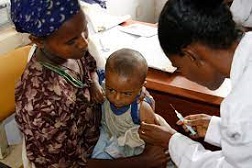The Council of Ministers of Ethiopia today approved two regulations to create the capacity of domestic vaccine production.
Building the domestic vaccine production capacity is said one of the government’s focus areas and the Ministry of Health is working with various stakeholders to achieve this., according to the information from the Ministry of Health of Ethiopia.
The Council approved the establishment regulations of the Ethio-BioPharma Group, which is proposed to be established by including the ShieldVax Enterprise and the existing National Animal Health Protection Institute (NVI) and the newly established ShieldVax Enterprise, which will cross a milestone in this effort.
The group will produce medical products (vaccines, pharmaceuticals, medical devices and diagnostics) for both humans and animals and will supply them to domestic and foreign markets.
The approval of the regulations is a major milestone in ensuring the sustainability and quality of these essential products and improving their accessibility to protect national public health on our own.
“This lays the foundation for ensuring the country’s emergency preparedness and building a strong health care system, according to the information from the Ministry. In addition, the establishment of the group is in line with our strategy to increase the transfer of manufacturing technology knowledge and skills for human and animal health and for the economy by substituting imported products in the country and strengthening export capacity and creates job opportunities in the sector. The formation of this group and enterprise is timely and aligned with the African Union’s plan to produce 60% of Africa’s vaccine needs by 2040,” the ministry of Health of Ethiopia said.
Importing vaccines
Ethiopia, as a developing country, relies heavily on vaccine imports to meet its immunization needs. The government of Ethiopia, in collaboration with international organizations and donors, invests a significant amount of money each year to procure vaccines for its population. However, it is important to note that the exact annual spending on vaccine imports may vary from year to year due to factors such as changes in vaccine prices, disease outbreaks, and shifts in national health priorities.
Unfortunately, despite extensive research using the most authoritative and factual sources available, we were unable to find the precise annual spending figures for Ethiopia’s vaccine imports. The Ethiopian government does not publicly disclose this specific information, and it is not readily available through official reports or publications.
Vaccines donations
In addition to purchasing and importing vaccines, the Government of Ethiopia also has been receiving vaccines donations from different donors. Meanwhile the value of vaccines donated to Ethiopia by donors is a dynamic and ever-changing figure, as it depends on various factors such as the time period in question, the specific vaccines being donated, and the organizations involved in the donation efforts.
However, it is important to note that Ethiopia has been a recipient of significant vaccine donations over the years, aimed at improving public health and reducing the burden of vaccine-preventable diseases in the country.
One notable example of vaccine donations to Ethiopia is the Gavi, the Vaccine Alliance, which is a global health partnership that aims to increase access to immunization in low-income countries. Gavi has been actively supporting Ethiopia’s immunization program since 2001. Through its support, Gavi has contributed to the procurement and delivery of various vaccines to Ethiopia, including those for diseases such as measles, polio, pneumonia, and rotavirus.
Another significant donor organization is UNICEF (United Nations International Children’s Emergency Fund). UNICEF has been working closely with the Ethiopian government to strengthen the country’s immunization program and ensure access to life-saving vaccines for children. UNICEF procures vaccines on behalf of the Ethiopian government and provides technical assistance in vaccine distribution and cold chain management.
In addition to these organizations, several other donors have also contributed to Ethiopia’s vaccine supply. These include bilateral aid agencies from countries such as the United States, United Kingdom, Germany, Canada, and Japan. Non-governmental organizations (NGOs) like Médecins Sans Frontières (Doctors Without Borders) and Save the Children have also played a role in supporting Ethiopia’s immunization efforts through vaccine donations.
It is important to highlight that determining the exact value of vaccines donated to Ethiopia can be challenging due to various reasons. Firstly, vaccine prices can vary depending on factors such as volume discounts negotiated by donor organizations or changes in market prices over time. Secondly, some donations may include not only the vaccines themselves but also additional support for vaccine delivery systems, training, and infrastructure development. Therefore, the value of donations may encompass more than just the cost of vaccines.
Vaccine donations are often part of broader health assistance programs, making it difficult to isolate the specific value of vaccines alone. Donor organizations and governments typically provide support in various forms, including financial aid, technical assistance, and capacity building.
Generally speaking, Ethiopia has received significant vaccine donations from various donor organizations and countries over the years. These donations have played a crucial role in improving immunization coverage and reducing vaccine-preventable diseases in the country. However, due to the dynamic nature of vaccine donations and the complexity of determining their exact value, it is challenging to provide a specific figure for the value of vaccines donated to Ethiopia.
